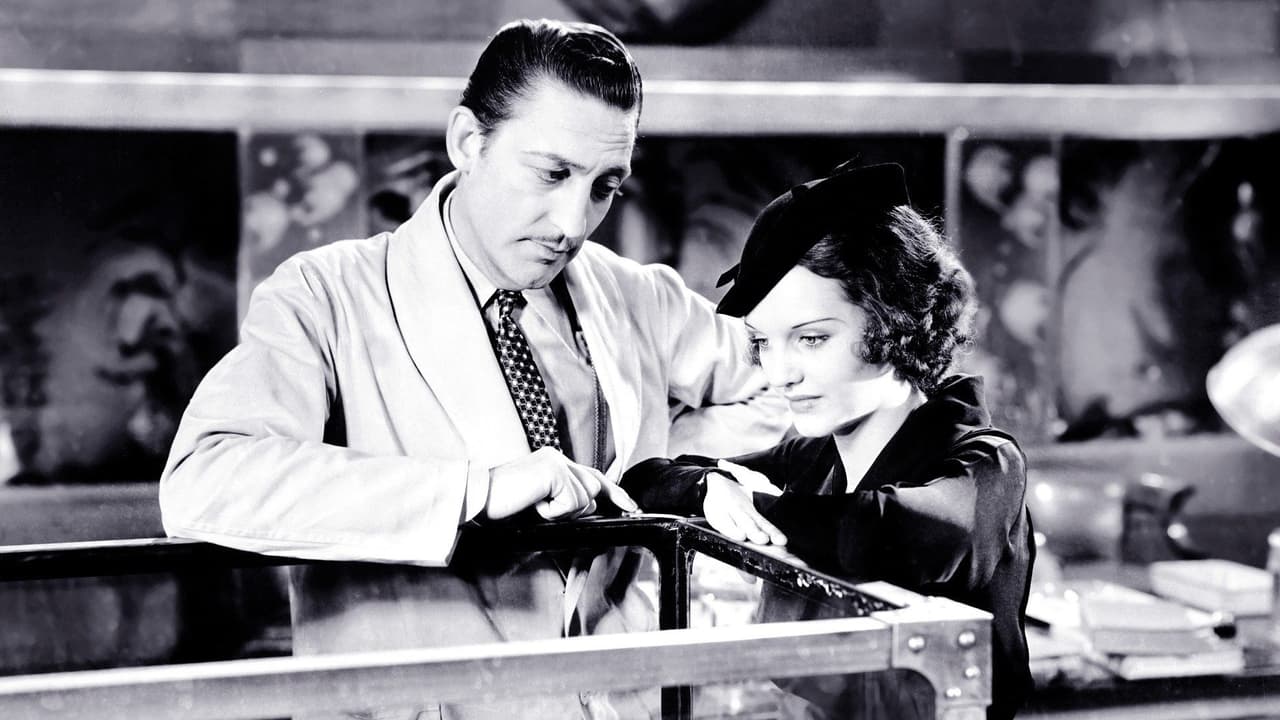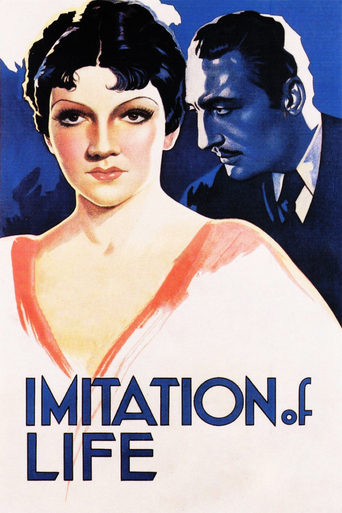

Good concept, poorly executed.
... View MoreAlthough it has its amusing moments, in eneral the plot does not convince.
... View Morean ambitious but ultimately ineffective debut endeavor.
... View MoreOk... Let's be honest. It cannot be the best movie but is quite enjoyable. The movie has the potential to develop a great plot for future movies
... View MoreNominated for Best Picture of the year by the Academy, it features the beautiful Claudette Colbert, as a struggling woman who teams with her friend (played by Louise Beavers) to succeed with a pancake recipe and using her "Aunt Jemima-like" likeness.However, conflicts arise as the women age and their children (played by Rochelle Hudson and Fredi Washington, respectively) grow up. Additional quality supporting acting is provided by Warren William, Ned Sparks (who gets all the great lines!), and Alan Hale.Colbert is a single parent, trying to raise her daughter, when she meets Beavers who, with her daughter, moves in as Colbert's domestic help. With help from supplier Hale, they start a small cafe on the boardwalk. Sparks is a self proclaimed pancake connoisseur, down on his luck, who speaks two words ("box it") in exchange for a free meal. So, with his help, Colbert markets Beavers' pancake flour to great success. Beavers and her daughter continue to live with Colbert, and her daughter, because of the fond relationship that's grown between the two women.After 10 years of growing success, William is invited to a celebration party by Sparks, where he meets Colbert and a romance begins, even though Sparks "warns" her against it. The women struggle with their grown up children: Beavers with her light colored daughter (Fredi Washington) who wishes she were "white", Colbert with her daughter's (Rochelle Hudson) puppy love for her boyfriend William.Added to the National Film Registry in 2005, it was later remade in 1959 by director Douglas Sirk with actresses Lana Turner and Juanita Moore (Sandra Dee and Susan Kohner, respectively, play their grown- up daughters).
... View MoreThis 1934 filmed version of the story, which is well written, acted and directed, is the one worth watching. The 1959 version, which is none of these things, has purely historical interest. And the historical interest is this: if these films are anything to go by, in the 25 years between them race relations and the filming-making craft in America both went into reverse. Concentrating on the treatment of race for a moment, while the rabbit's foot and the 'will to death' clichés about African Americans have gone out of the story by 1959, opportunities and recognition for their race are seemingly more elusive than before. The Annie character in the earlier film is a business partner (albeit an unequal one, a '20%er') of her white friend; in the latter version she is no more than her maid and occasional confidante. In the 1934 version, Annie's daughter conforms to the 'tragic mulatto' stereotype but retains personal dignity; in the 1959 version she conforms to the 'promiscuous mixed-blood' stereotype and ends in the gutter. Both scripts struggle to interconnect the relationship between the ambitious white woman and her daughter and the relationship of the black woman and her daughter, in terms of dramatic action, thematic content and comparative time on screen. Although the films place both relationships under the one roof, they run largely in parallel: problems of 'white folks' and problems of 'black folks' are perceived to be so separate. The latter version does worse in this regard. At least the 1934 version tries to bridge the gap by having the Claudette Colbert character go in search of the runaway Sarah Anne. Lana Turner's character just pitches in a few trite comments. This lack of emotional commitment robs the final scene in the 1959 film of any of the power that is present in the earlier version when Colbert goes to comfort Annie's daughter at the hearse. With its undistinguished supporting cast, a terrible score and sometimes laughable dialogue, the remake would, I suspect, have disappeared from critical discussion had it not for its 'controversial' subject-matter and the star pull of an aging Turner. The 1934 version still looks and feels somewhat brave; certainly it has a lot more heart and quality. The DVD's quality in sound and image are also good.
... View MoreFannie Hurst's tear jerking 1933 novel about the sacrifices mothers make for their daughters spawned two popular movies separated by a quarter century of glacially-changing social attitudes - a highly regarded 1934 version that remains faithful to the book's narrative and an elaborate 1959 remake which changes certain plot details to service German-born filmmaker Douglas Sirk's heavily Baroque style of film-making. Both films maintain the same basic time-spanning storyline of two widows - one is a white woman who finds professional success but at a price that causes an unintended estrangement from her daughter, while the other is a black woman whose light-skinned daughter causes nothing but grief for all concerned.Directed by John M. Stahl, the black-and-white 1934 version focuses on Beatrice Pullman, a downtrodden white woman who bonds with Delilah Johnson, a cheery black woman, and opens up a waffle shop to support their daughters Jessie and Peola respectively. Their business becomes such a success that it gets franchised into a chain of coffee shops that market Delilah's waffle recipe and then turns into a major business venture producing the waffle mix en masse. Meantime, Delilah stays devoted to Beatrice as her maid (despite earning twenty percent of the company's profits), and together they raise their daughters. Beatrice eventually finds love with Stephen Archer, an ichthyologist for whom Jessie develops a crush. Far more seriously, Peola runs away to escape her black identity and puts Delilah into an emotional tailspin.In the same year she made "It Happened One Night" and DeMille's "Cleopatra", Claudette Colbert shows her trademark natural élan which allows her to be the emotional gravitational force her character Beatrice requires her to be. Louise Beavers, who made a career of playing sunny-faced maids, gets her one shot at a first-class role and plays Delilah with great poignancy despite the inherent racism behind the conception of the role. The rest of the cast is adequate, though the real standout is Fredi Washington, a seminal black actress who portrays Peola with searing resentment and deepening regret.
... View MoreOne can make a case that this film about the African - American racial realities of the New Deal period is the equivalent of "House Of Rothschild", a contemporary movie regarding Jews and anti-Semitism. Both movies are very well-intentioned for their day, but are somewhat appalling for the present day. "House Of Rothschild" had great performances by George Arliss as Nathan Rothschild, and Boris Karloff as his German foe, the bigoted Baron Ledranz. But it suggested that the key to the emancipation of the Jews (and their acceptance by gentile society) was tied to economic success and power. This ignored the roots of anti-Semitism in economic jealousy by non-Jews. In "Imitation Of Life", we see two poor single mothers, one white and one black, each with a daughter, who form a partnership that enriches them with an "Aunt Jemimah" baking empire. But in the real world, how frequently did white and black people cooperate that closely when millions of dollars were at stake? The ideas, however, of this film are not easy to reject totally. Forgetting the idea of inter-racial economic cooperation and money making, the idea that a white and a black woman could become close is not totally impossible, and the issues of the problems both women have with their daughters are still relevant.Claudette Colbert (Bea Pullman) and her daughter Rochelle Hudson (Jessie) find that they become rivals for Warren Williams (Steve Archer). The rivalry of the pair for the same man is not uncommon, and the sad resolution of the problem seems unfair to Bea. Wisely the script does not settle what the future will prove about this collision of sexual hopes.No such problem faces Louise Beavers (Delilah Johnson) and Freddie Washington (Peola). Beavers is a hard working, decent woman who is fully aware of what the average White person expects of a Black person's "attitudes" in the America (or Western World) of 1934. Subserviance is the key for survival. Beavers, in the story, is luckier than most of her people because she has made a large amount of money as Colbert's business partner. But she can only get so far with that advantage - she can't live in a mansion and hobnob with the social elite. But she doesn't really seem to care to. The old (and infuriating) phrase about "knowing her place" is acceptable to her. But Peola is light skinned, and can pass herself off as white. She desperately wants to do so - to "sneak" (for want of a better term) herself into the majority of the population, with all the attending economic, political, and social advantages. And Bea wants Peola to accept her racial difference.Today, of course, we feel that it is the sin of the society penalizing millions of non-whites that is the terrible wrong, not Peola's desperate attempt to grab at happiness. But in 1934 it was Peola who was found to be wrong. Her selfishness leads to killing the saintly, decent Delilah, and Peola realizes this at the conclusion - at her mother's funeral.Before leaving this I have to point out that Peola's gamble probably would have been difficult in the long run. In the 1920s, New York society was shocked and titillated by the Kip Rhinelander Divorce Scandal. The son of a wealthy old New York family, Rhinelander married a very attractive woman. Then their child turned out to be African-American. The resulting divorce action was very ugly. If Peola married a white man, she would run a similar risk (as would all "white" descendants of the couple) due to genetics. Oddly enough, this particular situation is not a dated story theme. On an episode of LAW AND ORDER about six years ago, the murder of a woman was tied to her trying to regain her son by her ex-husband: the husband (like Peola) could pass himself off as white, and was a high ranking business executive with a new wife, who was white, and also a bigot.Among other things to note in this film is the use of the "Aunt Jemimah" clone in 1934 - a key to the long term success of that brand with the American public (and one that still exists), and the business deal that Ned Sparks and Colbert are negotiation with a clone of General Mills or some other food conglomerate. The funeral of Delilah also is notable, for the appearance of members of the Black Middle class in the scenes, in particular the men in quasi-military uniforms who must belong to some "mason" like club, and who give the deceased a goodbye beneath their outstretched military sabers. The appearance of Preston Sturges as one of the screenplay writers suggests some of the touches - Sturges liked to poke fun at well known brand names. In "Christmas In July", for instance, the coffee company is Maxford's (like Maxwell House).I find this a well acted and thoughtful movie for 1934, and yes, Louise Beavers did give her most tragic performance in this film. But the acceptance of racial inequalities that really are not acceptable anymore (although much improvement is still needed) does stick in one's craw.
... View More